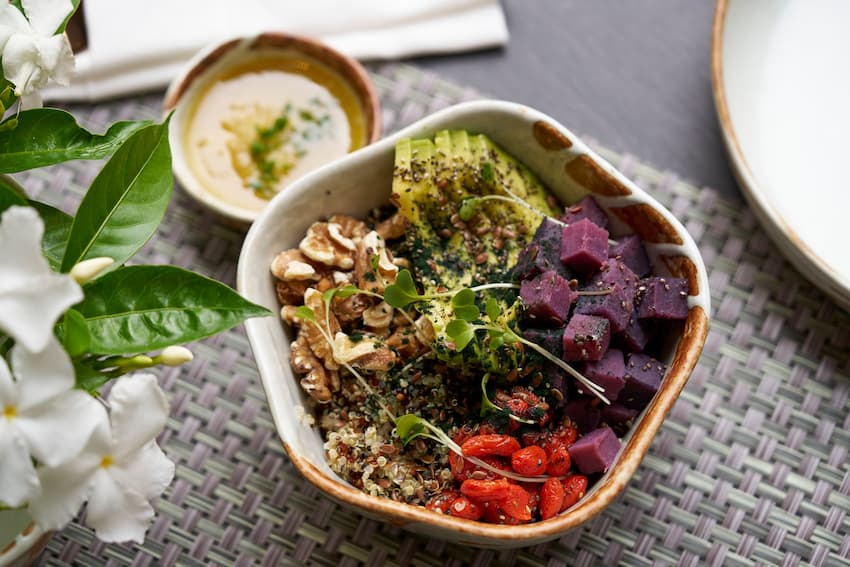Ayurveda, an ancient medical system from India, embodies a holistic approach to health and wellness. It emphasises the mind, body, and spirit integration and balance. Rooted in practices that date back thousands of years, Ayurveda offers a comprehensive framework for living a healthy life, grounded in understanding nature’s rhythms and how they interact with the human body.
Central to Ayurvedic medicine is the concept of the doshas—Vata, Pitta, and Kapha—which represent distinct combinations of the five essential elements: ether, air, fire, water, and earth. Each individual is believed to have a unique constitution, or Prakriti, defined by the balance of these doshas, which influences their physical, emotional, and mental characteristics.
Ayurvedic diets play a crucial role in this system, tailored to maintain or restore the balance of the doshas within an individual. Unlike one-size-fits-all dietary approaches, Ayurvedic nutrition is personalised, considering an individual’s doshic makeup, the season, and their current state of health. The aim is to nurture the body through foods that balance the doshas, support digestive health, and promote inner harmony.
The importance of Ayurvedic diets extends beyond mere nutrition. These diets are designed to be a medicine capable of healing and preventing disease. By selecting foods that counteract imbalances, enhance digestion, and rejuvenate the body, Ayurvedic diets contribute to overall well-being, longevity, and a vibrant life.
Ayurvedic Principles
Ayurveda is a holistic system of medicine from India. It is grounded in balance within the body and harmony with the natural world. Central to its philosophy are the principles of the three doshas and the concept of Agni, or digestive fire. Together, these form the foundation of Ayurvedic nutrition and wellness practices.
The Three Doshas:
Vata (Ether + Air):
Vata governs movement and communication within the body, including the heart’s pulsation, muscle movement, and nerve impulses. When in balance, Vata promotes creativity and flexibility. Imbalances may lead to anxiety, dry skin, and digestive issues.
Pitta (Fire + Water):
Pitta controls metabolism, energy production, and digestion. A balanced Pitta fosters intelligence and understanding, whereas an imbalance can cause irritability, inflammation, and indigestion.
Kapha (Water + Earth):
Kapha is responsible for growth, strength, and stability. It hydrates all cells and systems, lubricates the joints, and maintains immunity. When balanced, Kapha is expressed as love and forgiveness, but excess can lead to lethargy, weight gain, and congestion.
Each individual possesses a unique combination of these doshas, determining their physical, mental, and emotional traits. Ayurveda seeks to maintain or restore the innate doshic balance of an individual, thereby promoting health and preventing disease.
Agni (Digestive Fire)
Agni, the digestive fire, is a crucial concept in Ayurveda, representing the metabolic processes that transform food into energy. Strong Agni ensures efficient digestion, absorption, and assimilation of nutrients, as well as the elimination of wastes. Weak Agni, on the other hand, can lead to toxin accumulation, indigestion, and various health issues. Maintaining a balanced Agni is crucial for overall health, and dietary choices significantly support or diminish this digestive fire.
Ayurvedic diets are meticulously tailored to an individual’s dominant dosha(s) and the state of their Agni, aiming to balance the doshas and enhance digestive health. This personalisation is based on:
Food Qualities:
Specific tastes and food qualities balance each dosha. Warm, moist, and grounding foods balance Vata; cool, light, and dry foods pacify Pitta, and stimulating, light, and warm foods mitigate Kapha excess.
Seasonal Variations:
Ayurveda also recommends adjusting one’s diet with the seasons to harmonise internal doshic balance with external environmental changes.
Current State of Health:
The choice of foods can address specific health concerns or imbalances, supporting the body’s natural healing processes.
The Basics of Ayurvedic Diets
Ayurvedic diets are grounded in centuries-old principles and aim to nourish the body, mind, and spirit. Central to these diets are the concepts of whole foods, seasonal eating, the six tastes, proper food combinations, and meal timing. These components work together to promote balance and health according to one’s unique doshic constitution.
Whole Foods
At the heart of Ayurvedic nutrition is the emphasis on whole foods. These are unprocessed, naturally occurring foods rich in prana (life force). Whole foods include grains, legumes, vegetables, fruits, nuts, seeds, and dairy. Ayurveda encourages consuming these foods in their most natural state to maximise the body’s absorption of nutrients and life energy.
Seasonal Eating
Ayurveda recognises that nature’s cycles affect our internal environment and doshic balance. Eating seasonally means aligning our diet with the naturally available produce during each season. This practice supports the body’s nutritional needs and helps maintain harmony with the natural world. For instance, cooling foods like cucumber and watermelon are favoured in summer (Pitta season), while warming foods such as root vegetables and spices are beneficial in winter (Vata season).
The Six Tastes
Ayurveda identifies six tastes that should be present in every meal to satisfy dietary needs and prevent cravings or overeating. These tastes are sweet, sour, salty, bitter, pungent, and astringent. Each taste corresponds to specific nutritional needs and helps to balance the doshas. For example, sweet tastes nourish and build the body’s tissues, sour tastes stimulate digestion, and bitter tastes detoxify the body.
Food Combinations and Meal Timing
Proper food combinations are crucial in Ayurvedic diets. Certain foods can disturb the doshas, impair digestion, and accumulate toxins. Ayurveda advises against overeating and recommends consuming the most significant meal when the digestive fire (Agni) is strongest, usually at midday.
Meal timing is another crucial aspect. Regular, spaced meals help regulate the body’s internal clock, digestion, and overall energy levels. Snacking between meals is generally discouraged to allow the digestive system to rest and maintain a strong Agni.
Impact of Food on Mind and Body
Ayurveda teaches that food directly impacts not only physical health but also mental and emotional well-being. Foods that are naturally grown and rich in prana contribute to a clear, calm mind and a robust and healthy body. Conversely, processed, stale, or incompatible with one’s dosha can lead to physical discomfort and mental unrest.
Tailoring Diets to Dosha Types
In Ayurveda, understanding one’s dominant dosha and its current state of balance is crucial for optimising health and well-being. Diet plays a pivotal role in maintaining or restoring this balance. Each dosha thrives on certain foods while being aggravated by others. Here’s how to tailor diets to harmonise Vata, Pitta, and Kapha doshas, along with tips for seasonal adjustments.
Vata-Balancing Diet
Foods to Favour:
- Warm, cooked, nourishing foods like soups and stews.
- Healthy fats and oils are grounding for Vata’s dryness.
- Sweet, sour, and salty tastes; think cooked fruits, root vegetables, and dairy products.
- Spices like ginger, cumin, and cardamom enhance digestion without being overly stimulating.
Foods to Avoid:
- Cold and raw foods, including salads and raw vegetables, which can exacerbate Vata’s cold nature.
- Drying foods like popcorn and crackers.
- Bitter, pungent, and astringent tastes, as found in certain green leafy vegetables, coffee, and chocolate.
Pitta-Balancing Diet
Foods to Favour:
- Cool and refreshing foods, such as salads and sweet fruits.
- Bitter, sweet, and astringent tastes help calm Pitta’s heat; consider apples, cucumbers, and leafy greens.
- Dairy can be soothing for Pitta but should be consumed in moderation.
- Herbs and spices like coriander, fennel, and mint offer cooling effects.
Foods to Avoid:
- Hot, spicy, oily, and fried foods that can inflame Pitta’s fiery nature.
- Sour fruits, citrus juices, and sour cream, which can provoke Pitta.
- Salty foods, which tend to increase heat and promote fluid retention.
Kapha-Balancing Diet
Foods to Favour:
- Light, dry, and warm foods counteract Kapha’s heaviness; think grilled or baked lean meats and dry-cooked grains.
- Bitter, pungent, and astringent tastes; include plenty of green vegetables, beans, and legumes.
- Spices like turmeric, cinnamon, and black pepper stimulate digestion and metabolism.
Foods to Avoid:
- Sweet, sour, and salty tastes that exacerbate Kapha’s qualities.
- Heavy foods like cakes, pies, and deep-fried items.
- Dairy products can increase mucus production and sluggishness in Kapha types.
Seasonal Adjustments for Dosha Balance
Vata Season (Fall/Early Winter):
Focus on warm, moist, and grounding foods to counteract the dry and cold qualities of Vata.
Pitta Season (Late Spring/Summer):
Opt for cool, refreshing, mildly spiced foods to soothe Pitta’s heat.
Kapha Season (Late Winter/Early Spring):
Light, warm, and stimulating foods help dissipate Kapha’s cold and heavy characteristics.
Ayurvedic Dietary Practices
Ayurvedic dietary practices extend beyond mere food choices. They encompass a holistic approach to how and when we eat, the importance of detoxification, and the integration of certain superfoods to promote optimal health.
Detoxification is central to Ayurveda, which emphasises the removal of ama, or toxins accumulated in the body. In Ayurvedic philosophy, ama results from improper digestion and is the root cause of most diseases. It manifests through various symptoms, including lethargy, indigestion, cloudy thoughts, and illness. Ayurvedic detoxification practices, such as Panchakarma, aim to cleanse the body, restore digestive fire (Agni), and eliminate ama, thereby preventing disease and restoring health.
Incorporating Ayurvedic Superfoods into Your Diet
Ayurveda identifies several superfoods that offer immense health benefits and can help balance the doshas. Integrating these foods into your diet can enhance vitality and well-being:
Ghee (Clarified Butter):
Revered in Ayurveda for its nourishing qualities, ghee is believed to enhance Agni without increasing Pitta. It’s beneficial for all dosha types, supporting digestion and the assimilation of nutrients.
Turmeric:
Known for its anti-inflammatory properties, turmeric helps purify the blood, protect the liver, and balance all three doshas.
Ginger: A universal Ayurvedic remedy, ginger improves digestion, alleviates nausea, and balances Vata and Kapha.
Triphala:
A staple in Ayurvedic medicine, Triphala is a blend of three fruits: detoxifying, rejuvenating, and supporting digestive health.
Mung Beans:
Easily digestible and nourishing, mung beans are excellent for detoxification, particularly for Pitta and Kapha types.
Mindful Eating
Mindful eating is a crucial component of Ayurvedic nutrition, emphasising the importance of being present and attentive to the experience of eating. This practice encourages eating in a calm and relaxed environment, focusing on food’s taste, texture, and aroma and listening to the body’s hunger and satiety signals. Mindful eating supports Agni by ensuring that food is adequately chewed and digested, leading to improved nutrient absorption and elimination of ama. It also fosters a healthier relationship with food, aiding in weight management and reducing overeating and digestive issues.
Tips for Adopting an Ayurvedic Diet
Embracing an Ayurvedic diet is a journey towards understanding and harmonising your body’s needs with the rhythms of nature. For those new to Ayurveda or looking to refine their dietary habits, here are practical tips to ease the transition, streamline meal planning, and overcome common challenges.
Starting with Ayurvedic Eating:
Identify Your Dosha:
Begin by understanding your primary dosha. Numerous online quizzes and resources can help, but the most accurate insight comes from consulting with an Ayurvedic practitioner.
Focus on Digestion:
Pay attention to your digestive health. Start your day with warm water and lemon to stimulate Agni, and try to eat your largest meal at noon when your digestive fire is strongest.
Incorporate the Six Tastes:
Aim to include all six tastes (sweet, sour, salty, bitter, pungent, astringent) in your daily diet to ensure nutritional balance and satisfaction after meals.
Meal Planning and Preparation:
Batch Cooking:
Prepare bulk grains, legumes, and vegetables at the beginning of the week. This will make it easier to assemble balanced meals quickly.
Spice Blends:
Create dosha-specific spice mixes to add flavour and medicinal qualities to dishes effortlessly.
Simplify Breakfast:
Have simple, digestible breakfast options ready, such as overnight oats (for Vata), fruit salads (for Pitta), or spiced apple porridge (for Kapha).
Common Challenges:
Dealing with Dietary Restrictions:
Tailor Ayurvedic principles to fit any dietary restrictions by focusing on food’s qualities (heating or cooling, heavy or light) rather than specific ingredients.
Eating Out:
When dining out, choose the closest options to your dosha-balancing foods. Most restaurants can accommodate requests for less oil or spice.
Managing Cravings:
Understand that cravings often signal imbalances. Instead of succumbing to unhealthy cravings, seek out Ayurvedic alternatives that satisfy both your palate and your dosha.
Ayurvedic Herbs and Spices
Ayurvedic herbs and spices are valued for enhancing flavour and medicinal properties. They play a crucial role in balancing the doshas and promoting health. These natural enhancers are incorporated into an Ayurvedic diet to support digestion, boost immunity, and provide various other health benefits.
Ayurvedic Herbs and Spices
- Turmeric:
Known for its anti-inflammatory and antioxidant properties, turmeric supports the immune system and purifies the blood. Due to its cooling effect, it balances all three doshas, especially Pitta. - Cumin:
Cumin aids digestion, helps detoxify the body, and balances Vata and Kapha by increasing Agni without aggravating Pitta. - Coriander:
Coriander seeds are cooling and thus beneficial for Pitta. They support digestion and detoxification and balance all doshas. - Ginger:
A universal medicine in Ayurveda, fresh ginger kindles Agni, stimulates appetite, and helps alleviate digestive discomfort. It’s particularly warming for Vata and Kapha. - Fennel:
Sweet and cooling, fennel seeds are excellent for balancing Pitta. They aid digestion, soothe the stomach, and reduce gas and bloating. - Cardamom:
Cardamom is known for its ability to detoxify the body and refresh the palate. It balances Kapha and Pitta, and its sweet taste can also soothe Vata. - Ashwagandha:
This adaptogen supports the nervous system, enhances vitality, and balances Vata and Kapha by strengthening and nourishing the body.
Balancing Each Dosha with Herbs and Spices
- For Vata:
Incorporate warming spices such as ginger, cinnamon, cardamom, and cloves into your diet to stimulate digestion and warm the body. These spices help counteract Vata’s cold and dry qualities. - For Pitta:
Favor cooling spices like fennel, coriander, mint, and dill, which soothe Pitta’s hot and intense nature. These spices promote cooling and are less likely to aggravate Pitta. - For Kapha:
Opt for pungent and heating spices such as black pepper, cayenne, mustard seeds, and turmeric to stimulate digestion and counteract Kapha’s heavy and moist qualities.
Integrating these herbs and spices into your daily diet can be simple and enjoyable. Add them to teas, soups, stews, or vegetable dishes. For instance, morning tea with ginger and cardamom can awaken the digestive system, while turmeric added to rice or vegetables can enhance their health benefits and flavour. Experimenting with these spices enriches your meals and brings the therapeutic qualities of Ayurvedic cooking into your daily life.
FAQs
Q: Can anyone follow an Ayurvedic diet, or is it only for people with health issues?
Anyone can follow an Ayurvedic diet. It’s designed to address health issues, maintain overall health, and prevent disease by balancing the body’s doshas. Ayurveda provides guidelines that can be adapted to individual needs, making it suitable for everyone.
Q: Is an Ayurvedic diet vegetarian?
While many Ayurvedic diets lean towards vegetarianism due to the emphasis on whole, plant-based foods and gentle digestion, they are not strictly vegetarian. Ayurveda recognises the nutritional value of various types of food, including meat, and suggests them based on individual constitutions and seasonal changes. The key is balance and mindful consumption.
Q: Do I have to give up my favourite foods to follow an Ayurvedic diet?
Not necessarily. Ayurveda encourages moderation and understanding the impact of foods on your body. It’s about making more conscious choices. Some of your favourite foods can be balanced with others to mitigate any adverse effects.
Q: How quickly can I expect to see changes after starting an Ayurvedic diet?
The time frame varies depending on individual factors like dosha imbalances, lifestyle, and adherence to dietary recommendations. Some people may notice improvements in digestion, energy levels, and overall well-being within a few weeks, while others may require a longer period to see significant changes.
Q: Can Ayurvedic diets help with weight loss?
Yes, Ayurvedic diets can support weight loss in a healthy, balanced way by focusing on foods that naturally enhance digestion and metabolism without depriving the body of essential nutrients. Ayurveda also emphasises mindful eating, preventing overeating and promoting a healthier relationship with food.
Q: How does Ayurveda view processed foods?
Ayurveda advises minimising processed foods, as they often contain preservatives, artificial flavours, and other additives that can disrupt dosha balance and Agni (digestive fire). For optimal health, Ayurveda promotes whole, freshly prepared foods.
Q: Is it expensive to follow an Ayurvedic diet?
Adopting an Ayurvedic diet does not have to be expensive. While some exotic herbs and spices can be pricey, the diet mainly emphasises whole grains, legumes, vegetables, and fruits, which are generally affordable. Planning and preparing meals at home can also help manage costs.
Q: How do I know which dosha I am?
Determining your dosha involves assessing physical characteristics, emotional tendencies, and lifestyle preferences. While online quizzes can provide a general idea, consulting with an Ayurvedic practitioner offers the most accurate assessment through detailed analysis and personal consultation.
Ayurvedic Retreats in Chiang Mai
Nestled amid the tranquil beauty of Northern Thailand, Aleenta Retreat Chiang Mai is a sanctuary for those wanting to immerse themselves in the ancient wisdom of Ayurveda. These wellness retreats are dedicated to offering a harmonious blend of luxury and traditional Ayurvedic practices, providing a unique opportunity for guests to experience profound healing, rejuvenation, and self-discovery.
Aleenta Retreat Chiang Mai has meticulously designed its wellness programs to align with Ayurvedic principles, ensuring that every aspect of your stay contributes to your physical, mental, and spiritual well-being. The retreat’s Ayurah Spa and Wellness Centre is at the heart of this experience, where expert practitioners guide you through personalised treatments and therapies based on your dosha, or constitutional type, and individual health needs.
The retreat offers a variety of wellness programs that incorporate Ayurvedic treatments, yoga, meditation, and nutrition to support balance and harmony within the body and mind. Each program addresses specific wellness goals, whether you’re seeking detoxification, stress relief, weight management, or a deeper understanding of Ayurvedic living.
Detox and Rejuvenation:
This program focuses on purifying the body of toxins (ama), enhancing digestive fire (Agni), and revitalising the body’s innate healing capabilities. Treatments may include Panchakarma, a comprehensive Ayurvedic detox, herbal medicines and nutritional guidance.
Stress Relief and Mindfulness:
Aimed at reducing stress and promoting mental clarity, this program combines Ayurvedic therapies, meditation, and pranayama (breathwork) to calm the mind and soothe the nervous system.
Ayurvedic Nutrition:
Understanding that food is medicine, Aleenta’s Ayurvedic retreats strongly emphasise nutrition. Meals are carefully prepared according to Ayurvedic dietary principles, using fresh, seasonal ingredients to nourish the body and balance the doshas.
At Aleenta Retreat Chiang Mai, the Ayurvedic journey extends beyond physical treatments and dietary adjustments. The serene environment fosters a deep connection with nature, enhancing healing. Guests are encouraged to partake in daily yoga sessions, nature walks, and mindfulness practices, all designed to complement the Ayurvedic therapies and promote holistic well-being.
Whether you are new to Ayurveda or looking to deepen your existing practice, Aleenta Retreat Chiang Mai offers a nurturing space to explore this ancient healing system’s transformative power. Guests feel rejuvenated through personalised care, expert guidance, and a supportive environment, with renewed vitality and a more profound sense of balance and harmony.
Discover more about the Ayurvedic retreats at Aleenta Chiang Mai and how they can support your journey to wellness.
Related Articles
- Holistic Healing in Chiang Mai with Ayurvedic Marma Therapy
- Ayurvedic Principles of Thai Massage
- Thai Yoga Massage for Holistic Health & Wellness
- Ayurvedic Principles: An Introduction
- Mindfulness Retreats in Chiang Mai Wellness Hotels
Aleenta Retreat
Chiang Mai
189 Soi Ban Mai Lang Mo 18,
Suthep, Muang Chiang Mai District,
Chiang Mai 50200
T: +66 (0)52 090 333











